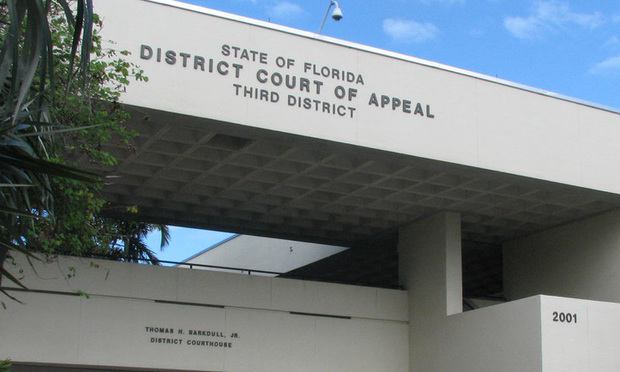Appellate Court Ruling Expands the Definition of Engle Class Member
The Third District Court of Appeal ruled last week that prospective Engle class members could be residents or citizens — not both — of Florida at the time their smoking-related disease first manifests or is diagnosed.
September 19, 2018 at 10:45 AM
6 minute read
 Third District Court of Appeal at 2001 SW 117th Ave., in Miami. Photo: J. Albert Diaz/ALM
Third District Court of Appeal at 2001 SW 117th Ave., in Miami. Photo: J. Albert Diaz/ALM
A quibble over who qualifies to bring an Engle progeny tobacco lawsuit has been settled following an appellate court ruling.
In an opinion authored by Judge Richard J. Suarez and dated Sept. 12, the Third District Court of Appeal ruled that a smoker does not need to be both a Florida citizen and resident to qualify as an Engle class member. Rather, being a citizen or a resident of Florida at the time their smoking-related disease first manifested or was diagnosed — prior to the Engle class membership cutoff date of Nov. 21, 1996 — is sufficient.
“No case in Florida has specifically addressed the singular issue presented here, whether the 'all [Florida] citizens and residents, and their survivors' language of Engle must be interpreted to require a plaintiff to prove that the deceased was both a citizen and a resident of Florida at the pertinent time, or be interpreted to require a plaintiff to prove only that the deceased was either a citizen of Florida or a resident of Florida at the pertinent time,” the opinion said. “Based on our analysis, we find that the proper interpretation requires a plaintiff to prove only that the deceased was either a citizen of Florida or a resident of Florida at the time the smoking-related disease manifested or was diagnosed.”
Read the Third District Court of Appeal's ruling on the definition of an Engle class member:
The appeals court referred to Maldonado v. Allstate Ins. Co, a case heard by the Florida Second District Court of Appeal in 2001, to define the qualifications of a Florida resident, as opposed to a Florida citizen.
“One may be a resident of one jurisdiction although having a domicile in another. Further, 'residency' can allow for temporary 'residence' in an 'abode,' as compared to a home. Although domicile and residency are often used interchangeably, they are different legal concepts. A 'domicile' is a person's home. A person has a domicile at all times. In some contexts, the phrase 'legal residency' may be used in lieu of 'domicile,' ” the appellate court ruled in the Maldonado case.
“Citizenship,” on the other hand, is a more clearly defined concept for purposes of status and membership in the United States of America,” the cited opinion continued. “Citizenship implies membership in a community from which one receives a grant of certain political rights and privileges and is often based upon one's connection to the jurisdiction by birth or naturalization. In the context of citizenship in Florida or any other state, the term is often comparable to domicile or legal residence. Residency is not equivalent to citizenship, and the relationship between one's national citizenship and one's residency is tenuous at best.”
The underlying case concerned a wrongful death lawsuit brought by Elsa Chacon against Philip Morris Tobacco Co. Chacon and husband, Robiel, moved to Miami in 1988. Robiel Chacon was diagnosed with lung cancer in 1994, following nearly four decades as a three- to four-pack-a-day smoker. He died from lung cancer about two years later in February 1996.
Chacon and her attorneys, Alex Alvarez and Philip E. Holden of the Alvarez Law Firm in Coral Gables, appealed the case after a trial court ruled that Chacon's husband was not both a citizen and resident of Florida, and therefore did not qualify to pursue litigation as an Engle class member.
The appellate court ruled to reverse and remand the case in light of the newfound clarity on who qualifies as an Engle progeny. The appeals court's ruling has opened the door for a new trial “in which Elsa Chacon will be allowed to prove that Mr. Chacon was either a citizen or a resident of the State of Florida within the 'manifestation or diagnosis' time frame established by Engle,” according to the opinion.
The opinion also addressed an appeal on the part of Philip Morris' counsel, Frank Cruz-Alvarez and Alexandra Bach Lagos of Miami law firm Shook, Hardy & Bacon, concerning the legal definition of “resident.”
“The trial court, over Philip Morris' objection, instructed the jury that the definition of 'residence' is, '[a]ny place of abode or dwelling place constitutes a 'residence,' however temporary it may be,” Suarez's opinion read. “Philip Morris objected to the 'however temporary' language, contending that the proper standard to determine residency is 'legal residency.' Philip Morris contends that a person is a “legal resident” if he or she lives in a place and has no present intention of leaving.”
Despite reversing and remanding the trial court's finding that Chacon's late husband was not both a resident and a citizen of Florida and therefore did not qualify as an Engle progeny, the appellate court ruled that the lower court “properly instructed the jury regarding the distinction between 'resident' and 'citizen,'” and affirmed on Philip Morris's cross-appeal.
Cruz-Alvarez declined to comment when contacted by the Daily Business Review.
 Alex Alvarez, of The Alvarez Law Firm. Photo: J. Albert Diaz/ALM
Alex Alvarez, of The Alvarez Law Firm. Photo: J. Albert Diaz/ALMAlvarez, who is well-known for his work handling Engle progeny cases and yielding substantive awards from tobacco companies, told the Daily Business Review that he was pleased with the ruling.
“This was a unique case and a case of first impression. … The tobacco company said that you had to be both a citizen and a resident [of Florida to qualify as Engle progeny],” Alvarez said.
According to Alvarez, this was not what he and Holden understood the original ruling opening the flood gates for Engle progeny cases to mean. He added that the quibble was one primarily of “grammatical structure.”
Alvarez said, “The Court of Appeals wrote an opinion that supported our proposition and I think it just broadens the scope and definition of Engle, which was the intent of the drafters of the class action.”
Related stories:
South Florida Lawyers Win $36M Tobacco Verdict
R.J. Reynolds Slammed With $42M Verdict With No Fault for Smoker
Meet Alex Alvarez, the Coral Gables Lawyer Winning Millions Against Cigarette Companies
This content has been archived. It is available through our partners, LexisNexis® and Bloomberg Law.
To view this content, please continue to their sites.
Not a Lexis Subscriber?
Subscribe Now
Not a Bloomberg Law Subscriber?
Subscribe Now
NOT FOR REPRINT
© 2025 ALM Global, LLC, All Rights Reserved. Request academic re-use from www.copyright.com. All other uses, submit a request to [email protected]. For more information visit Asset & Logo Licensing.
You Might Like
View All
US Judge Dismisses Lawsuit Brought Under NYC Gender Violence Law, Ruling Claims Barred Under State Measure

No Two Wildfires Alike: Lawyers Take Different Legal Strategies in California
5 minute read
Second DCA Greenlights USF Class Certification on COVID-19 College Tuition Refunds
3 minute read
Florida Law Firm Sued for $35 Million Over Alleged Role in Acquisition Deal Collapse
3 minute readTrending Stories
- 1Some Thoughts on What It Takes to Connect With Millennial Jurors
- 2Artificial Wisdom or Automated Folly? Practical Considerations for Arbitration Practitioners to Address the AI Conundrum
- 3The New Global M&A Kings All Have Something in Common
- 4Big Law Aims to Make DEI Less Divisive in Trump's Second Term
- 5Public Notices/Calendars
Who Got The Work
J. Brugh Lower of Gibbons has entered an appearance for industrial equipment supplier Devco Corporation in a pending trademark infringement lawsuit. The suit, accusing the defendant of selling knock-off Graco products, was filed Dec. 18 in New Jersey District Court by Rivkin Radler on behalf of Graco Inc. and Graco Minnesota. The case, assigned to U.S. District Judge Zahid N. Quraishi, is 3:24-cv-11294, Graco Inc. et al v. Devco Corporation.
Who Got The Work
Rebecca Maller-Stein and Kent A. Yalowitz of Arnold & Porter Kaye Scholer have entered their appearances for Hanaco Venture Capital and its executives, Lior Prosor and David Frankel, in a pending securities lawsuit. The action, filed on Dec. 24 in New York Southern District Court by Zell, Aron & Co. on behalf of Goldeneye Advisors, accuses the defendants of negligently and fraudulently managing the plaintiff's $1 million investment. The case, assigned to U.S. District Judge Vernon S. Broderick, is 1:24-cv-09918, Goldeneye Advisors, LLC v. Hanaco Venture Capital, Ltd. et al.
Who Got The Work
Attorneys from A&O Shearman has stepped in as defense counsel for Toronto-Dominion Bank and other defendants in a pending securities class action. The suit, filed Dec. 11 in New York Southern District Court by Bleichmar Fonti & Auld, accuses the defendants of concealing the bank's 'pervasive' deficiencies in regards to its compliance with the Bank Secrecy Act and the quality of its anti-money laundering controls. The case, assigned to U.S. District Judge Arun Subramanian, is 1:24-cv-09445, Gonzalez v. The Toronto-Dominion Bank et al.
Who Got The Work
Crown Castle International, a Pennsylvania company providing shared communications infrastructure, has turned to Luke D. Wolf of Gordon Rees Scully Mansukhani to fend off a pending breach-of-contract lawsuit. The court action, filed Nov. 25 in Michigan Eastern District Court by Hooper Hathaway PC on behalf of The Town Residences LLC, accuses Crown Castle of failing to transfer approximately $30,000 in utility payments from T-Mobile in breach of a roof-top lease and assignment agreement. The case, assigned to U.S. District Judge Susan K. Declercq, is 2:24-cv-13131, The Town Residences LLC v. T-Mobile US, Inc. et al.
Who Got The Work
Wilfred P. Coronato and Daniel M. Schwartz of McCarter & English have stepped in as defense counsel to Electrolux Home Products Inc. in a pending product liability lawsuit. The court action, filed Nov. 26 in New York Eastern District Court by Poulos Lopiccolo PC and Nagel Rice LLP on behalf of David Stern, alleges that the defendant's refrigerators’ drawers and shelving repeatedly break and fall apart within months after purchase. The case, assigned to U.S. District Judge Joan M. Azrack, is 2:24-cv-08204, Stern v. Electrolux Home Products, Inc.
Featured Firms
Law Offices of Gary Martin Hays & Associates, P.C.
(470) 294-1674
Law Offices of Mark E. Salomone
(857) 444-6468
Smith & Hassler
(713) 739-1250






